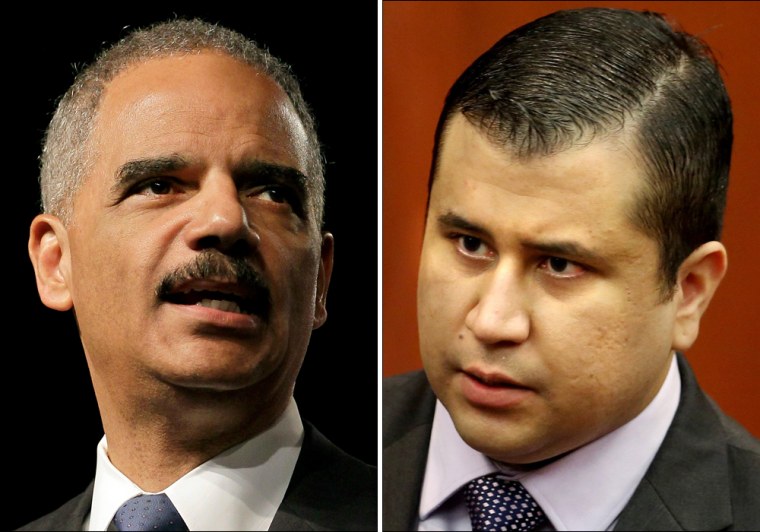
Calling the killing of Florida teenager Trayvon Martin a "tragic, unnecessary shooting," Attorney General Eric Holder on Monday repeated the Justice Department's intention to take a fresh look at the case and evaluate whether federal prosecutors could bring charges of their own.
A decision is very likely months away. But several legal experts say it would be surprising if the federal government filed a criminal case against George Zimmerman.
"Based on what's in the public eye, it would be very difficult to get a conviction in this case," said Samuel Bagenstos, a former top official in the Justice Department's Civil Rights Division.
If the government were to bring a criminal case, it would most likely invoke the four-year old federal hate crime statute named for Matthew Shepard and James Byrd, both of whom were killed in vicious bias attacks. Shepard was targeted in Wyoming because he was gay. Byrd was singled out in Texas because he was black.
Part of the federal law is a provision making it a crime to cause "bodily injury to any person ... because of the actual or perceived race" of the victim. It's that element of intent that makes prosecutions under the statute so difficult.
"Usually when you have a successful prosecution, you have multiple statements made by the defendant about the victim's race while the defendant is attacking, or you have a group of people that went out looking for someone of a particular race to attack," Bagenstos said.
"Proving what's on somebody eles's mind is as difficult thing to do in the law as possible."
He and other former civil rights prosecutors say it would not be enough for the Justice Department to claim that George Zimmerman started following Trayvon Martin because of his race. The government would also have to convince a jury that Martin was killed because of his race, not because of self-defense or some other motive, the experts said.
William Yeomans, another former DOJ Civil Rights Division official noted, "That would be the big hurdle: establishing that George Zimmerman was thinking about race when he inflicted the bodily injury."
Yeomans said it would provide at best a starting point for a federal prosecution. "You could make the argument that because the incident was initiated because of race, that should suffice. But a jury would be free to find that that was not adequate."
Proving intent, he agreed, is the hardest challenge in bringing a successful prosecution in hate crime cases. "It's extremely difficult to establish beyond a reasonable doubt what was in the defendant's mind when he committed the act."
After the verdict on Saturday, defense lawyer Mark O’Mara said race had not played any role in Zimmerman’s actions that night and said his client had been made a “scapegoat” by civil rights advocates.
"I think that things would have been different if George Zimmerman was black for this reason: he never would have been charged with a crime," he said.
"The facts that night, [it] was not borne out that he acted in a racial way," O’Mara added. "His history is a non-racist."
A Justice Department statement on Sunday was carefully worded to avoid generating an expectation that the federal government would ultimately choose to file charges in the case.
It said experienced prosecutors will determine whether the evidence reveals a prosecutable violation "of any of the limited federal criminal civil rights statutes within our jurisdiction."
George Zimmerman has sued NBC Universal for defamation. The company strongly denies the allegation.